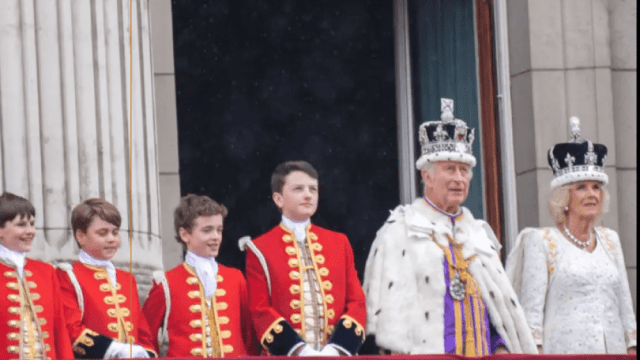
King Charles III and Queen Camilla and other Royal Family Members on the Buckingham Palace balcony during the Coronation. Photo: Michael Tubi/Shutterstock.com
Our love affair with monarchy has endured for millennia. Professor Caillan Davenport explains the appeal of sole rulers.
In a world where 700 million people live in extreme poverty, 43 countries still bow to sovereign leaders.
Whether their title is emperor, sultan, emir or king, these rulers enjoy extraordinary power and privilege.
Amid soaring living costs and increased demands for equality, why do so many nations still recognise monarchs as their heads of state?
Professor Caillan Davenport is researching this very question.
Davenport, the Head of the Centre for Classical Studies at the Australian National University, says that previous research into the inner workings of monarchies has often overlooked one simple fact: a lot of people actually like them.
“Rulership by one person is a popular, cross-cultural phenomenon,” he says.
“For many, the idea of a single leader watching over the state offers clarity and a sense of strength and continuity – something that can feel reassuring in an uncertain world.
“Democracy, on the other hand, can be messy. It requires negotiation, compromise and hard work. That’s not necessarily a flaw, but it helps explain why elected leaders often struggle to deliver on their promises when they hit political roadblocks.”
Charismatic rulers
Since the dawn of civilisation, democracies have been disrupted by the allure of sole rulers.
History is littered with examples: before Rome chose Augustus as its first emperor, the city-state was a republic with elected officials; before Hitler seized power, Germany was known as the Weimar Republic. This cycle has repeated since ancient times.
“There has always been an innate human desire to try to find the best form of political system,” Davenport explains.
“This debate dates back to ancient Greece, and it’s never really been settled.
“Democracies and republics have historically entailed an interplay of factions, interest groups, and patronage.
“When the balance tips too far and one group gains power at the expense of others – we often witness democratic decay.”
A ruler’s personal charisma often plays a role in the appeal of monarchy – an effect that can linger for generations.
“If we look at history’s great transitions more often than not, they were led by larger-than-life figures surrounded by myth and legend, such as Cyrus the Great or Julius Caesar,” Davenport says.
“Successors often trade on the legacy of the original leaders – think of the Founding Fathers in America or Kim Il Sung’s dynasty in North Korea.
“Strong monarchical systems can even sustain weak leaders. Take Queen Elizabeth II – she was genuinely popular. Whether King Charles possesses that same personal appeal is debatable, but he undoubtedly benefits from the glow of her legacy.”
The many faces of monarchy
For most of history, monarchy has been the prevalent form of government.
Its endurance, Davenport says, is key to understanding the recent resurgence of strongmen in global politics.
“We can’t treat authoritarianism as something completely separate from monarchy. At its core, monarchy is the rule of one person and it can take many forms.
“There are even monarchical elements in republics and democracies. Some presidents, for example, can behave as if they monarchs in everything but name, but hopefully this can be constrained by the fact that they are subject to election and serve limited terms.”
To understand why monarchies have withstood the test of time, Davenport will challenge the Eurocentric mindset in his field – so often fixated on Athens and Rome.
“The Mediterranean, as a whole, was a laboratory of constitutional experimentation. By expanding the scope of Classical Studies to include places like Western Africa, Egypt, Syria, and Persia, I’m trying to challenge long-held assumptions about monarchy,” he says.
Davenport’s aim is to increase Australia’s capacity to understand not only the imperialist legacies of monarchy but also the dangers authoritarian rulers pose to democracy.
“In Australia, our constitutional monarchy is a very strong system with checks and balances,” he says. “But, as in any democracy, there’s always potential for instability, particularly with the rise of someone who has the charisma to win people over.”
Could Australia become a republic?
As per a recent survey, a majority of Australians (57 per cent) believe the country should remain a monarchy.
“There is a sense of loyalty to the British royal house in Australia. But there is also uncertainty about how to replace the figure of the head of state without significantly changing the balance of our constitution,” Davenport says.
“And then there’s the cost. Changing the model of government isn’t cheap, and with the cost of living crisis many Australians would question whether that is the best way to spend public money.
“During Prime Minister Anthony Albanese’s tenure, the role of Assistant Minister for the Republic was created in 2022 only to be abolished two years later, showing Australia’s priorities have changed.”
Will Australia ever ditch the crown?
“I think it’ll happen,” Davenport says.
“It won’t be tomorrow – maybe in 50 years – but the real question is: what kind of republic will Australians agree on?”
Disclaimer: The views expressed herein are those of the author and are not those of the Australian Government or the ARC.
This article originally published by ANU Reporter, here.